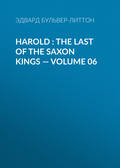
Эдвард Бульвер-Литтон
Godolphin, Complete
CHAPTER III
THE HERO INTRODUCED TO OUR READER’S NOTICE.—DIALOGUE BETWEEN HIMSELF AND HIS FATHER.—PERCY GODOLPHIN’s CHARACTER AS A BOY.—THE CATASTROPHE OF HIS SCHOOL LIFE
“Percy, remember that it is to-morrow you will return to school,” said Mr. Godolphin to his only son.
Percy pouted, and after a momentary silence replied, “No, father, I think I shall go to Mr. Saville’s. He has asked me to spend a month with him; and he says rightly that I shall learn more with him than at Dr. Shallowell’s, where I am already head of the sixth form.”
“Mr. Saville is a coxcomb, and you are another!” replied the father, who, dressed in an old flannel dressing-gown, with a worn velvet cap on his head, and cowering gloomily over a wretched fire, seemed no bad personification of that mixture of half-hypochondriac, half-miser, which he was in reality. “Don’t talk to me of going to town, sir, or—”
“Father,” interrupted Percy, in a cool and nonchalant tone, as he folded his arms, and looked straight and shrewdly on the paternal face—“father, let us understand each other. My schooling, I suppose, is rather an expensive affair?”
“You may well say that, sir! Expensive!—It is frightful, horrible, ruinous!—Expensive! Twenty pounds a year board and Latin; five guineas washing; five more for writing and arithmetic. Sir, if I were not resolved that you should not want education, though you may want fortune, I should—yes, I should—what do you mean, sir?—you are laughing! Is this your respect, your gratitude to your father?”
A slight shade fell over the bright and intelligent countenance of the boy.
“Don’t let us talk of gratitude,” said he sadly; “Heaven knows what either you or I have to be grateful for! Fortune has left to your proud name but these bare walls and a handful of barren acres; to me she gave a father’s affection—not such as Nature had made it, but cramped and soured by misfortunes.”
Here Percy paused, and his father seemed also struck and affected. “Let us,” renewed in a lighter strain this singular boy, who might have passed, by some months, his sixteenth year,—“let us see if we cannot accommodate matters to our mutual satisfaction. You can ill afford my schooling, and I am resolved that at school I will not stay. Saville is a relation of ours; he has taken a fancy to me; he has even hinted that he may leave me his fortune; and he has promised, at least, to afford me a home and his tuition as long as I like. Give me free passport hereafter to come and go as I list, and I in turn, will engage never to cost you another shilling. Come, sir, shall it be a compact?”
“You wound me, Percy,” said the father, with a mournful pride in his tone; “I have not deserved this, at least from you. You know not, boy—you know not all that has hardened this heart; but to you it has not been hard, and a taunt from you—yes, that is the serpent’s tooth!”
Percy in an instant was at his father’s feet; he seized both his hands, and burst into a passionate fit of tears. “Forgive me,” he said, in broken words; “I—I meant not to taunt you. I am but a giddy boy!—send me to school!—do with me as you will!”
“Ay,” said the old man, shaking his head gently, “you know not what pain a son’s bitter word can send to a parent’s heart. But it is all natural, perfectly natural! You would reproach me with a love of money, it is the sin to which youth is the least lenient. But what! can I look round the world and not see its value, its necessity? Year after year, from my first manhood, I have toiled and toiled to preserve from the hammer these last remnants of my ancestor’s remains. Year after year fortune has slipped from my grasp; and, after all my efforts, and towards the close of a long life, I stand on the very verge of penury. But you cannot tell—no man whose heart is not seared with many years can tell or can appreciate, the motives that have formed my character. You, however,”—and his voice softened as he laid his hand on his son’s head, “you, however,—the gay, the bold, the young,—should not have your brow crossed and your eye dimmed by the cares that surround me. Go! I will accompany you to town; I will see Saville myself. If he be one with whom my son can, at so tender an age, be safely trusted, you shall pay him the visit you wish.”
Percy would have replied but his father checked him; and before the end of the evening, the father had resolved to forget as much as he pleased of the conversation.
The elder Godolphin was one of those characters on whom it is vain to attempt making a permanent impression. The habits of his mind were durably formed: like waters, they yielded to any sudden intrusion, but closed instantly again. Early in life he had been taught that he ought to marry an heiress for the benefit of his estate—his ancestral estate; the restoration of which he had been bred to consider the grand object and ambition of life. His views had been strangely baffled; but the more they were thwarted the more pertinaciously he clung to them. Naturally kind, generous, and social, he had sunk, at length, into the anchorite and the miser. All other speculations that should retrieve his ancestral honours had failed: but there is one speculation that never fails—the speculation of saving! It was to this that he now indissolubly attached himself. At moments he was open to all his old habits; but such moments were rare and few. A cold, hard, frosty penuriousness was his prevalent characteristic. He had sent this son, with eighteen pence in his pocket, to a school of twenty pounds a-year; where, naturally enough, he learned nothing but mischief and cricket: yet he conceived that his son owed him eternal obligations.
Luckily for Percy, he was an especial favourite with a certain not uncelebrated character of the name of Saville; and Saville claimed the privilege of a relation to supply him with money and receive him at his home. Wild, passionate, fond to excess of pleasure, the young Godolphin caught eagerly at these occasional visits; and at each his mind, keen and penetrating as it naturally was, took new flights, and revelled in new views. He was already the leader of his school, the torment of the master, and the lover of the master’s daughter. He was sixteen years old, but a character. A secret pride, a secret bitterness, and an open wit and recklessness of bearing, rendered him to all seeming a boy more endowed with energies than affections. Yet a kind word from a friend’s lips was never without its effect on him, and he might have been led by the silk while he would have snapped the chain. But these were his boyish traits of mind: the world soon altered them.
The subject of the visit to Saville was not again touched upon. A little reflection showed Mr. Godolphin how nugatory were the promises of a schoolboy that he should not cost his father another shilling; and he knew that Saville’s house was not exactly the spot in which economy was best learned. He thought it, therefore, more prudent that his son should return to school.
To school went Percy Godolphin; and about three weeks afterwards, Percy Godolphin was condemned to expulsion for returning, with considerable unction, a slap in the face that he had received from Dr. Shallowell. Instead of waiting for his father’s arrival, Percy made up a small bundle of clothes, let himself drop, by the help of the bed-curtains, from the window of the room in which he was confined, and towards the close of a fine summer’s evening, found himself on the highroad between and London, with independence at his heart and (Saville’s last gift) ten guineas in his pocket.
CHAPTER IV
PERCY’S FIRST ADVENTURE AS A FREE AGENT
It was a fine, picturesque outline of road on which the young outcast found himself journeying, whither he neither knew nor cared. His heart was full of enterprise and the unfledged valour of inexperience. He had proceeded several miles, and the dusk of the evening was setting in, when he observed a stage-coach crawling heavily up a hill, a little ahead of him, and a tall, well-shaped man, walking alongside of it, and gesticulating somewhat violently. Godolphin remarked him with some curiosity; and the man, turning abruptly round, perceived, and in his turn noticed very inquisitively, the person and aspect of the young traveller.
“And how now?” said he, presently, and in an agreeable, though familiar and unceremonious tone of voice; “whither are you bound this time of day?”
“It is no business of yours, friend,” said the boy with the proud petulance of his age; “mind what belongs to yourself.”
“You are sharp on me, young sir,” returned the other; “but it is our business to be loquacious. Know, sir,”—and the stranger frowned—“that we have ordered many a taller fellow than yourself to execution for a much smaller insolence than you seem capable of.”
A laugh from the coach caused Godolphin to lift up his eyes, and he saw the door of the vehicle half-open, as if for coolness, and an arch female face looking down on him.
“You are merry on me, I see,” said Percy; “come out, and I’ll be even with you, pretty one.”
The lady laughed yet more loudly at the premature gallantry of the traveller; but the man, without heeding her, and laying his hand on Percy’s shoulder, said—
“Pray, sir, do you live at B–?” naming the town they were now approaching.
“Not I,” said Godolphin, freeing himself from the intrusion.
“You will, perhaps, sleep there?”
“Perhaps I shall.”
“You are too young to travel alone.”
“And you are too old to make such impertinent remarks,” retorted Godolphin, reddening with anger.
“Faith, I like this spirit, my Hotspur,” said the stranger, coolly. “If you are really going to put up for the night at B–, suppose we sup together?”
“And who and what are you?” asked Percy, bluntly.
“Anything and everything! in other words, an actor!”
“And the young lady–?’
“Is our prima donna. In fact, except the driver, the coach holds none but the ladies and gentlemen of our company. We have made an excellent harvest at A–, and we are now on our way to the theatre at B–; pretty theatre it is, too, and has been known to hold seventy-one pounds eight shillings.” Here the actor fell into a reverie; and Percy, moving nearer to the coach-door, glanced at the damsel, who returned the look with a laugh which, though coquettish, was too low and musical to be called cold.
“So that gentleman, so free and easy in his manners, is not your husband?”
“Heaven forbid! Do you think I should be so gay if he were? But, pooh! what can you know of married life? No!” she continued, with a pretty air of mock dignity; “I am the Belvidera, the Calista, of the company; above all control, all husbanding, and reaping thirty-three shillings a week.”
“But are you above lovers as well as husbands?” asked Percy with a rakish air, borrowed from Saville.
“Bless the boy! No: but then my lovers must be at least as tall, and at least as rich, and, I am afraid, at least as old, as myself.”
“Don’t frighten yourself, my dear,” returned Percy; “I was not about to make love to you.”
“Were you not? Yes, you were, and you know it. But why will you not sup with us?”
“Why not, indeed?” thought Percy, as the idea, thus more enticingly put than it was at first, pressed upon him. “If you ask me,” he said, “I will.”
“I do ask you, then,” said the actress; and here the hero of the company turned abruptly round with a theatrical start, and exclaimed, “To sup or not to sup? that is the question.”
“To sup, sir,” said Godolphin.
“Very well! I am glad to hear it. Had you not better mount and rest yourself in the coach? You can take my place—I am studying a new part. We have two miles farther to B– yet.”
Percy accepted the invitation, and was soon by the side of the pretty actress. The horses broke into a slow trot, and thus delighted with his adventure, the son of the ascetic Godolphin, the pupil of the courtly Saville, entered the town of B–, and commenced his first independent campaign in the great world.
CHAPTER V
THE MUMMERS.—GODOLPHIN IN LOVE.—THE EFFECT OF FANNY MILLINGER’S ACTING UPON HIM.—THE TWO OFFERS.—GODOLPHIN QUITS THE PLAYERS
Our travellers stopped at the first inn in the outskirts of the town. Here they were shown into a large room on the ground-floor, sanded, with a long table in the centre; and, before the supper was served, Percy had leisure to examine all the companions with whom he had associated himself.
In the first place, there was an old gentleman, of the age of sixty-three, in a bob-wig, and inclined to be stout, who always played the lover. He was equally excellent in the pensive Romeo and the bustling Rapid. He had an ill way of talking off the stage, partly because he had lost all his front teeth: a circumstance which made him avoid, in general, those parts in which he had to force a great deal of laughter. Next, there was a little girl, of about fourteen, who played angels, fairies, and, at a pinch, was very effective as an old woman. Thirdly, there was our free-and-easy cavalier, who, having a loud voice and a manly presence, usually performed the tyrant. He was great in Macbeth, greater in Bombastes Furioso. Fourthly, came this gentleman’s wife, a pretty, slatternish woman, much painted. She usually performed the second female—the confidante, the chambermaid—the Emilia to the Desdemona. And fifthly, was Percy’s new inamorata,—a girl of about one-and-twenty, fair, with a nez retrousse: beautiful auburn hair, that was always a little dishevelled; the prettiest mouth, teeth, and dimple imaginable; a natural colour; and a person that promised to incline hereafter towards that roundness of proportion which is more dear to the sensual than the romantic. This girl, whose name was Fanny Millinger, was of so frank, good-humoured, and lively a turn, that she was the idol of the whole company, and her superiority in acting was never made a matter of jealousy. Actors may believe this, or not, as they please.
“But is this all your company?” said Percy.
“All? no!” replied Fanny, taking off her bonnet, and curling up her tresses by the help of a dim glass. “The rest are provided at the theatre along with the candle-snuffer and scene-shifters part of the fixed property. Why won’t you take to the stage? I wish you would! you would make a very respectable—page.”
“Upon my word!” said Percy, exceedingly offended.
“Come, come!” cried the actress, clapping her hands, and perfectly unheeding his displeasure—“why don’t you help me off with my cloak?—why don’t you set me a chair?—why don’t you take this great box out of my way?—why don’t you–Heaven help me!” and she stamped her little foot quite seriously on the floor. “A pretty person for a lover you are!”
“Oho! then I am a lover, you acknowledge?”
“Nonsense!—get a chair next me at supper.”
The young Godolphin was perfectly fascinated by the lively actress; and it was with no small interest that he stationed himself the following night in the stage-box of the little theatre at –, to see how his Fanny acted. The house was tolerably well filled, and the play was She Stoops to Conquer. The male parts were, on the whole, respectably managed; though Percy was somewhat surprised to observe that a man, who had joined the corps that morning, blessed with the most solemn countenance in the world—a fine Roman nose, and a forehead like a sage’s—was now dressed in nankeen tights, and a coat without skirts, splitting the sides of the gallery in the part of Tony Lumpkin. But into the heroine, Fanny Millinger threw a grace, a sweetness, a simple, yet dignified spirit of trite love that at once charmed and astonished all present. The applause was unbounded; and Percy Godolphin felt proud of himself for having admired one whom every one else seemed also resolved upon admiring.
When the comedy was finished, he went behind the scenes, and for the first time felt the rank which intellect bestows. This idle girl, with whom he had before been so familiar; who had seemed to him, boy as he was, only made for jesting and coquetry, and trifling, he now felt to be raised to a sudden eminence that startled and abashed him. He became shy and awkward, and stood at a distance stealing a glance towards her, but without the courage to approach and compliment her.
The quick eye of the actress detected the effect she had produced. She was naturally pleased at it, and coming up to Godolphin, she touched his shoulder, and with a smile rendered still more brilliant by the rouge yet unwashed from the dimpled cheeks, said—“Well, most awkward swain? no flattery ready for me? Go to! you won’t suit me: get yourself another empress.”
“You have pleased me into respecting you,” said Godolphin.
There was a delicacy in the expression that was very characteristic of the real mind of the speaker, though that mind was not yet developed; and the pretty actress was touched by it at the moment, though, despite the grace of her acting, she was by nature far too volatile to think it at all advantageous to be respected in the long run. She did not act in the afterpiece, and Godolphin escorted her home to the inn.
So long as his ten guineas lasted—which the reader will conceive was not very long—Godolphin stayed with the gay troop, as the welcome lover of its chief ornament. To her he confided his name and history: she laughed heartily at the latter—for she was one of Venus’s true children, fond of striking mirth out of all subjects. “But what,” said she, patting his cheek affectionately, “what should hinder you from joining us for a little while? I could teach you to be an actor in three lessons. Come now, attend! It is but a mere series of tricks, this art that seems to you so admirable.”
Godolphin grew embarrassed. There was in him a sort of hidden pride that could never endure to subject itself to the censure of others. He had no propensity to imitation, and he had a strong susceptibility to the ridiculous. These traits of mind thus early developed—which in later life prevented his ever finding fit scope for his natural powers, which made him too proud to bustle, and too philosophical to shine—were of service to him on this occasion, and preserved him from the danger into which he might otherwise have fallen. He could not be persuaded to act: the fair Fanny gave up the attempt in despair. “Yet stay with us,” said she, tenderly, “and share my poor earnings.”
Godolphin started; and in the wonderful contradictions of the proud human heart, this generous offer from the poor actress gave him a distaste, a displeasure, that almost reconciled him to parting from her. It seemed to open to him at once the equivocal mode of life he had entered upon. “No, Fanny,” said he, after a pause, “I am here because I resolved to be independent: I cannot, therefore, choose dependence.”
“Miss Millinger is wanted instantly for rehearsal,” said the little girl who acted fairies and old women, putting her head suddenly into the room.
“Bless me!” cried Fanny, starting up; “is it so late? Well, I must go now. Good-bye! look in upon us—do!”
But Godolphin, moody and thoughtful, walked into the street; and lo! the first thing that greeted his eyes was a handbill on the wall, describing his own person, and offering twenty guineas reward for his detention. “Let him return to his afflicted parent,” was the conclusion of the bill, “and all shall be forgiven.”
Godolphin crept back to his apartment; wrote a long, affectionate letter to Fanny; inclosed her his watch, as the only keepsake in his power; gave her his address at Saville’s; and then, towards dusk, once more sallied forth, and took a place in the mail for London. He had no money for his passage, but his appearance was such that the coachman readily trusted him; and the next morning at daybreak he was under Saville’s roof.
CHAPTER VI
PERCY GODOLPHIN THE GUEST OF SAVILLE.—HE ENTERS THE LIFE-GUARDS AND BECOMES THE FASHION
“And so,” said Saville, laughing, “you really gave them the slip: excellent! But I envy you your adventures with the player folk. ‘Gad! if I were some years younger, I would join them myself; I should act Sir Pertinax Macsycophant famously; I have a touch of the mime in me. Well! but what do you propose to do?—live with me?—eh!”
“Why, I think that might be the best, and certainly it would be the pleasantest mode of passing my life. But–”
“But what?”
“Why, I can scarcely quarter myself on your courtesy; I should soon grow discontented. So I shall write to my father, whom I, kindly and considerately, by the way, informed of my safety the very first day of my arrival at B–. I told him to direct his letters to your house; but I regret to find that the handbill which so frightened me from my propriety is the only notice he has deigned to take of my whereabout. I shall write to him therefore again, begging him to let me enter the army. It is not a profession I much fancy; but what then! I shall be my own master.”
“Very well said!” answered Saville; “and here I hope I can serve you. If your father will pay the lawful sum for a commission in the Guards, why, I think I have interest to get you in for that sum alone—no trifling favour.”
Godolphin was enchanted at this proposal, and instantly wrote to his father, urging it strongly upon him; Saville, in a separate epistle, seconded the motion. “You see,” wrote the latter, “you see, my dear sir, that your son is a wild, resolute scapegrace. You can do nothing with him by schools and coercion: put him to discipline in the king’s service, and condemn him to live on his pay. It is a cheap mode, after all, of providing for a reprobate; and as he will have the good fortune to enter the army at so early an age, by the time he is thirty, he may be a colonel on full pay. Seriously, this is the best thing you can do with him,—unless you have a living in your family.”
The old gentleman was much discomposed by these letters, and by his son’s previous elopement. He could not, however, but foresee, that if he resisted the boy’s wishes, he was likely to have a troublesome time of it. Scrape after scrape, difficulty following difficulty, might ensue, all costing both anxiety and money. The present offer furnished him with a fair excuse for ridding himself, for a long time to come, of further provision for his offspring; and now growing daily more and more attached to the indolent routine of solitary economies in which he moved, he was glad of an opportunity to deliver himself from future interruption, and surrender his whole soul to his favourite occupation.
At length, after a fortnight’s delay and meditation, he wrote shortly to Saville and his son; saying, after much reproach to the latter, that if the commission could really be purchased at the sum specified he was willing to make a sacrifice, for which he must pinch himself, and conclude the business. This touched the son, but Saville laughed him out of the twinge of good feeling; and very shortly afterwards, Percy Godolphin was gazetted as a cornet in the – Life-Guards.
The life of a soldier, in peace, is indolent enough, Heaven knows! Percy liked the new uniforms and the new horses—all of which were bought on credit. He liked his new companions; he liked balls; he liked flirting; he did not dislike Hyde Park from four o’clock till six; and he was not very much bored by drills and parade. It was much to his credit in the world that he was the protege of a man who had so great a character for profligacy and gambling as Augustus Saville; and under such auspices he found himself launched at once into the full tide of “good society.”
Young, romantic, high-spirited—with the classic features of an Antinous, and a very pretty knack of complimenting and writing verses—Percy Godolphin soon became, while yet more fit in years for the nursery than the world, “the curled darling” of that wide class of high-born women who have nothing to do but to hear love made to them, and who, all artifice themselves, think the love sweetest which springs from the most natural source. They like boyhood when it is not bashful; and from sixteen to twenty, a Juan need scarcely go to Seville to find a Julia.
But love was not the worst danger that menaced the intoxicated boy. Saville, the most seductive of tutors—Saville who, in his wit; his bon ton, his control over the great world, seemed as a god to all less elevated and less aspiring,—Saville was Godolphin’s constant companion; and Saville was worse than a profligate—he was a gambler! One would think that gaming was the last vice that could fascinate the young: its avarice, its grasping, its hideous selfishness, its cold, calculating meanness, would, one might imagine, scare away all who have yet other and softer deities to worship. But, in fact, the fault of youth is that it can rarely resist whatever is the Mode. Gaming, in all countries, is the vice of an aristocracy. The young find it already established in the best circles; they are enticed by the habit of others, and ruined when the habit becomes their own.
“You look feverish, Percy,” said Saville, as he met his pupil in the Park. “I don’t wonder at it; you lost infernally last night.”
“More than I can pay,” replied Percy, with a quivering lip.
“No! you shall pay it to-morrow, for you shall go shares with me to-night. Observe,” continued Saville, lowering his voice, “I never lose.”
“How never?”
“Never, unless by design. I play at no game where chance only presides. Whist is my favourite game: it is not popular: I am sorry for it. I take up with other games,—I am forced to do it; but, even at rouge et noir, I carry about with me the rules of whist. I calculate—I remember.”
“But hazard?”
“I never play at that,” said Saville, solemnly. “It is the devil’s game; it defies skill. Forsake hazard, and let me teach you ecarte; it is coming into fashion.”
Saville took great pains with Godolphin; and Godolphin, who was by nature of a contemplative, not hasty mood, was no superficial disciple. As his biographer, I grieve to confess, that he became, though a punctiliously honest, a wise and fortunate gamester; and thus he eked out betimes the slender profits of a subaltern’s pay.
This was the first great deterioration in Percy’s mind—a mind which ought to have made him a very different being from what he became, but which no vice, no evil example, could ever entirely pervert.







